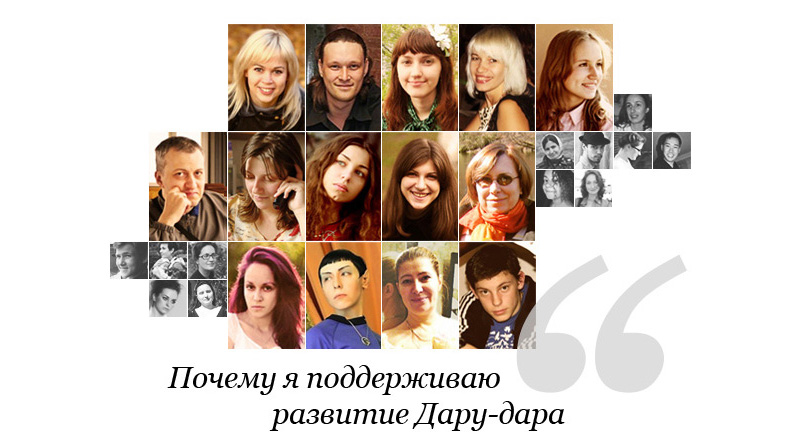Becker? Donor? Sponsor? Benefactor? Maecenas
 Recently, I had the opportunity to speak with the topic “Why give money” in the “Economics of Merit” club. Our current campaign of public funding, Duru-dara, asks us many questions, and I tried to answer some of them in my speech.
Recently, I had the opportunity to speak with the topic “Why give money” in the “Economics of Merit” club. Our current campaign of public funding, Duru-dara, asks us many questions, and I tried to answer some of them in my speech.First of all, I tried to understand what “crowdfunding” is, which arose as a concept quite recently and whose appearance symbolizes a new way of relating people to each other and to the world around them. How does this new way of donating money relate to already existing methods, such as sponsorship, charity and patronage of the arts?
In this article, I briefly summarize my presentation . I do not pretend to be an exhaustive story, but I hope this publication will be interesting and useful to everyone who tries to engage in crowdfunding in the Russian-speaking space.
')
And in the picture on the right, you can go to the video in which we sing the popular accordion song in Arbat - in support of Dar-dar (=
About the importance of Russian words
In our campaign of public funding of the Dur-dar, the most striking question, perhaps, is the following: “Why help an Internet project if it should be able to earn money? Isn't it better to help those who cannot earn money in principle? ”The reason for such questions is a widespread misunderstanding of who and why we can give money, in what circumstances it makes sense and what consequences can lead to.
In order for a social practice to find life, it is necessary to give it a name, fill it with a meaning that would be clear to everyone. It is no secret that most of the new meanings are now emerging in the English-speaking environment, and in the same place it acquires its names. The borrowed English words are poorly translated. They are quickly absorbed by those who constantly rotate in the English-speaking environment, but then spread very slowly - including among those who speak English, but do not use it in their daily lives. If we are talking about the formation of social practices, we assume it is the wide and rapid spread of the new word.
Therefore, it is very important to be able to translate English-language concepts and agree on the sharing of these new words. Or, if the literal translation does not come out, you need to look for suitable words that convey a similar meaning. And only as a last resort to resort to a literal translation. After all, behind every known word there is a whole series of associations, references to other important meanings. This is a huge energy, accumulated language over many generations of native speakers. And it’s a sin not to use this energy, introducing a word that nobody previously knew at all.
National funding
So, "crowdfunding." It sounds not at all in Russian. And the maximum with which it is associated, so it is with another inappropriate word "crowdsourcing." Why not translate it simply: "national funding"? Yes, we still have the restraint from the word “popular”, which is directly related to our collective inferiority complex in relation to the failed dream of the Soviet Union, socialism and communism. But it’s time to get rid of this complex, to recognize our collective experience as an awesome social experiment that no other people had! And why is it that US residents almost every project claiming to be globally distributed is called the “national project” and we cannot afford it? "People's financing" sounds convincing and romantic. It means "financial support for a variety of people." Much cooler than state support or organization support! It is so?
People's Patron
And how to call those who become a member of public funding, gives the project their money? In English, they are called "Beckers" (on Kickstarter) or "donors" (on Wikipedia). The first word means nothing to us at all, the second has a direct association with organ donation, also somehow not in the topic. How to call?
In other words, “national financing” can be called “national philanthropy”. Accordingly, a person who gives money to a project can be called a “people's philanthropist” or simply a “philanthropist”. This is a very good and partially forgotten word today, which gives us the opportunity to endow it with a new modern sound. Charity has a rich and noble history in Russia. The ancestors of most famous patrons came from the common people. The projects that they supported financially were often incomprehensible to contemporaries. And this support was always directly related to ethics and the personal passion of the patron.
If earlier patrons could be mostly wealthy people who single-handedly supported a particular project, then in the era of the ubiquitous Internet, uniting and connecting together billions of people, this practice makes sense for everyone. Because we understand that our personal, very small contribution connects with thousands and millions of other similar contributions and so moves a big common cause.
Sponsor? Benefactor? Maecenas!
So why is the “philanthropist”, not the “benefactor” or the “sponsor”? It is time to finally distinguish between these words. In my understanding of this distinction lies, in my opinion, one of the biggest problems in the way of Russian crowdfunding, i.e., national mentality. I found at one time a very simple and memorable description of how it all differs from one another.
Imagine a poor artist. So, the benefactor gives this poor artist money, because he is poor . A philanthropist gives a poor artist money because he is an artist . A sponsor of the same poor artist gives money to draw his logo .
It seemed to me a very beautiful explanatory example, from which everything else follows. That is, in other words, charity is aimed at solving fundamental human problems associated with life and survival, with what is the biological basis of our existence. But patronage is already related to culture. A philanthropist is a person who supports not the biological existence of a person, but the possibilities inherent in it, which are important for the good of other people, for the culture as a whole. The sponsor is simply engaged in business, his support for the donation of money is indirectly related.
Ethics patron
Charity is the smoothing of social inequality, it is mercy and compassion. You help those who simply will not survive without this help, who are obviously in relation to you in more adverse circumstances. Therefore, they say quite rightly that it is at least immodest to show off your charity.
Patronage of the arts is your contribution to what you are interested in, what you are interested in, what you believe in. This is your gratis social investment in something that can benefit many people in the future, just like you. And because this should be proud of, it is necessary to tell your friends and acquaintances, even if they do not understand your hobbies.
Hence the conclusion of how the visualization of patronage contributions should be organized at public funding sites. A cash contribution is a beautiful act that a person should be proud of. From such actions is the profile of his hobbies and demonstrates their real strength.
In the picture below, you can go to reviews of patrons of the Dur-dar

Pay what you want
Recently the practice of “Pay as you like” is gaining momentum . This practice has been around for a long time when, for example, we give money to a street musician or when we leave a tip to the waiter.
On the Internet, now we are increasingly not forcing a person to pay on a mandatory basis for downloading a book, music, film or program. We offer to download for free, but if possible to pay as much as the downloaded file will seem valuable to you within the budget that you have. Such a voluntary payment is our gratitude to the author of the work for the subjective benefit we received.
In a sense, this practice is related to the practice of folk philanthropy. Especially if we collect philanthropic contributions continuously and in the background. In this way, people thank the project for the specific benefits that this project has already brought to them.
However, if we are talking about a public finance campaign, here we are still talking not about expressing collective gratitude, but about social grants for the future of the project. And by making our contribution to the future, we rather appreciate not only the personal benefits that we will receive from the project, but also the benefits that others will receive.
Gratuitous and bonus patronage
Patronage may be gratuitous (as on Wikipedia) or bonus (as on Kickstarter). Statics shows that gratuitous patronage is more common. But this is another story.
Source: https://habr.com/ru/post/161413/
All Articles